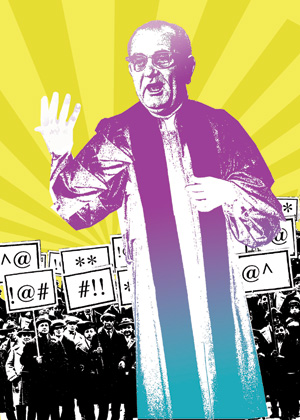When the Dallas Symphony Orchestra stages the world premiere of August 4, 1964 this month, it does so amid a rich haze of ironies. In his second week as music director, Dutchman Jaap van Zweden—called “truly European” by members of the orchestra—conducts a brand-new piece of American music about a president from Texas. (“I don’t know much about him,” Van Zweden told me. See profile on page 94.) Ostensibly commissioned to honor the 100th anniversary of the birth of Lyndon Baines Johnson, the new “secular oratorio” by composer Steven Stucky and lyricist Gene Scheer will not even attempt a traditional panegyric.
Stucky and Scheer build their oratorio around the events of a day that, as Stucky acknowledges, has nothing iconic about it in the popular imagination. When the bodies of three missing civil rights workers were discovered on August 4, 1964, under an earthen dam near Philadelphia, Mississippi, it brought to a grisly end a search that had riveted the nation, and Johnson—receiving this news in the Oval Office—had what he needed to channel national outrage into a 1964 civil rights bill. Other news had also been played up by the national press that day: an alleged second attack by North Vietnamese torpedo boats on U.S. ships in the Gulf of Tonkin. Since March, Johnson had been urged by the National Security Council to bomb North Vietnam, and shortly before midnight on August 4, he went on television to announce that he had authorized the attacks. A few days later, Congress overwhelmingly passed the Gulf of Tonkin Resolution that gave Johnson almost unlimited power to pursue the undeclared war.
When I spoke to Stucky in March, he was visiting Dallas to attend a DSO performance of his Pulitzer Prize-winning Second Concerto for Orchestra. He wanted to make it clear that in his oratorio (a “secular” one, unlike Handel’s Messiah), LBJ is hardly being apotheosized. “He’s not necessarily the hero. It’s more the time that’s the subject,” he says. “It is not really a celebration of LBJ so much as a look at ourselves as a people and as a country in the middle 1960s, and LBJ is of course a major source. He’s quite a character.”
That much is incontrovertible. Biographer and historian Robert Caro, author of the three massive volumes (so far) of The Years of Lyndon Johnson, documents his charm, his manipulation of others, his vulgarity, his lying, his power to be spellbinding, his physical cowardice, his need for affection, his obsequiousness, his ruthlessness, and on and on. He’s such a complex character, in fact, that it’s hard to ignore further ironies in the timing of this world premiere. Fine, a centennial—but 2008 lines up even better with the dramatic bookends, 1948 and 1968, of the political career of LBJ on the national stage.
Sixty years ago this fall, LBJ overcame popular former Texas governor Coke Stevenson’s tremendous early lead. Dallas played a major historical role in 1948, according to Caro, because conservative businessmen here threw their support behind LBJ when Sid Richardson and Clint Murchison—who knew whereof they spoke—convinced them that Johnson could deliver the goods for them in Washington, despite Johnson’s earlier, politically expedient allegiance to FDR and the New Deal. By way of testing him, these unnamed men insisted that Johnson deliver a “reactionary” anti-union radio speech in the prize time slot once reserved for W. Lee “Pappy” O’Daniel, the homespun “Neanderthal” against whom Johnson had run for the Senate (and lost) in a 1941 special election. A pure political pragmatist, Johnson did what these men wanted. He surprised his own speechwriter with his enthusiasm on the air, as though he meant every word. Maybe he did, if singing what they wanted to hear would give him the election. Later that fall, of course, he had to steal the winning votes outright with the help of the “Duke of Duval,” South Texas boss George Parr, not to mention future Supreme Court justice Abe Fortas. LBJ went to the Senate gleefully calling himself “Landslide Lyndon” for his 87-vote victory.
In 1968, after his legitimate landslide victory over Barry Goldwater in 1964—legitimate with respect to the ballot boxes, if not the political ads (the famous mushroom cloud)—Johnson found himself beleaguered by protests over the war in Vietnam. (“Hey! Hey! LBJ! How many kids did you kill today?”) He chose not to run for a second full term, ending his political career despite a burning lifelong ambition for the presidency second to none in American history. Well, except for his successor’s. This fall also marks the anniversary of the election that brought to power LBJ’s greatest historical lightning rod in diverting political hatred from his reputation. Richard Nixon, by the way, already has his own opera—John Adams’ Nixon in China.
In thinking about how to approach such a monumental personality as LBJ’s, librettist Gene Scheer “went through all sorts of iterations of what might be an approach,” Stucky says. “He got very fascinated at one time by that first election that LBJ stole.” Somebody beat Scheer to it, as it happens. In February 2007, Steven Jones and Lyric Stage produced The Winner, a musical by composer Lewis Flinn and book writer/lyricist Joe Sutton about Johnson’s 1948 senatorial campaign. The plot included Johnson’s unheard-of, publicity-seeking travel by helicopter; his philandering; his political dirty dealings; and his redemption through the support of Lady Bird. Historically, it fudged a little, but it worked well in getting across the political and personal contradictions of the man and the eventual momentous significance of the outcome, especially in terms of the Civil Rights Movement.
Stucky was unaware of The Winner—not that there could be any overlap in the story Scheer finally decided to tell. In August 1964, less than a year after Kennedy’s assassination in Dallas, Johnson still had his own presidency to forge, and the events of the one day Scheer chose after reading biographies, conducting interviews, and poring over documents set the president’s course, both for good and ill. The oratorio centers on two women and two men (and if you’re wondering about whether it’s fudged, “95 percent of the words sung are the actual words of people involved in those turbulent times,” the DSO claims). Soprano Laquita Mitchell and mezzo Kelley O’Connor sing the mothers of two of the men—James Earl Chaney, 21, who was black, and Andrew Goodman, 20, who was Jewish—unearthed that day in Mississippi. “Gene found statements that they gave to newspapers about what it was like,” Stucky says. “So you’ve got all these nice contrasts. You’ve got the two women, and then you’ve got the two men who are mostly trying to figure out how to prosecute the war.” Baritone Robert Orth sings Johnson himself, and tenor Vale Rideout takes on Secretary of Defense Robert McNamara—though somehow neither historical figure strikes me as the singing type.
I asked Stucky whether he had seen Errol Morris’ documentary about McNamara, The Fog of War. “Yes. I thought it was terrific and startling,” he says. McNamara makes it plain in the film that he now believes the major U.S. involvement in Vietnam came from faulty intelligence about the second torpedo attacks on U.S. destroyers. Topical parallels cry out, but Stucky distances himself from such interpretations. “I am not trying to capture the characters historically,” he insists again.
“I couldn’t write a Lincoln portrait—solemn, patriotic whitewash—and I couldn’t write Nixon in China, by John Adams.” But he could get LBJ to sing, something Dallas was also always able to do.
August 4, 1964 runs September 18–21, with performances at 8 pm, except on the 21st (2:30 pm). For tickets, go to dallassymphony.com, or call 214-692-0203.







